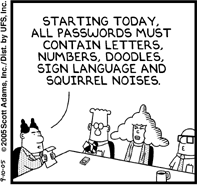Dilbert
| Dilbert | |
|---|---|

"Announcement of changes in company password policy". From left: the Pointy-Haired Boss, Dilbert, Alice, and Wally
(Pub. September 10, 2005) |
|
| Author(s) | Scott Adams |
| Website | http://www.dilbert.com/ |
| Launch date | April 16, 1989 |
| Syndicate(s) |
United Media (1989–2011) Universal Uclick (June 2011–) |
| Publisher(s) | Andrews McMeel Publishing |
| Genre(s) | Humor |
Dilbert is an American comic strip written and illustrated by Scott Adams, first published on April 16, 1989. The strip is known for its satirical office humor about a white-collar, micromanaged office featuring engineer Dilbert as the title character. The strip has spawned several books, an animated television series, a video game, and hundreds of Dilbert-themed merchandise items. Dilbert Future and The Joy of Work are among the most read books in the series. Adams received the National Cartoonists Society Reuben Award in 1997 and the Newspaper Comic Strip Award in the same year for his work on the strip. Dilbert appears online and in 2,000 newspapers worldwide in 65 countries and 25 languages.
The comic strip originally revolved around Dilbert and his "pet" dog Dogbert in their home. Many plots revolved around Dilbert's engineer nature or his bizarre inventions. Also prominent were plots based on Dogbert's megalomaniacal ambitions. Later, the location of most of the action moved to Dilbert's workplace and the strip started to satirize technology, workplace, and company issues. The comic strip's popular success is attributable to its workplace setting and themes, which are familiar to a large and appreciative audience; Adams has said that switching the setting from Dilbert's home to his office was "when the strip really started to take off". The workplace location is Silicon Valley.
Dilbert portrays corporate culture as a Kafkaesque world of bureaucracy for its own sake and office politics that stand in the way of productivity, where employees' skills and efforts are not rewarded, and busy work is praised. Much of the humor emerges as the audience sees the characters making obviously ridiculous decisions that are natural reactions to mismanagement.
...
Wikipedia
